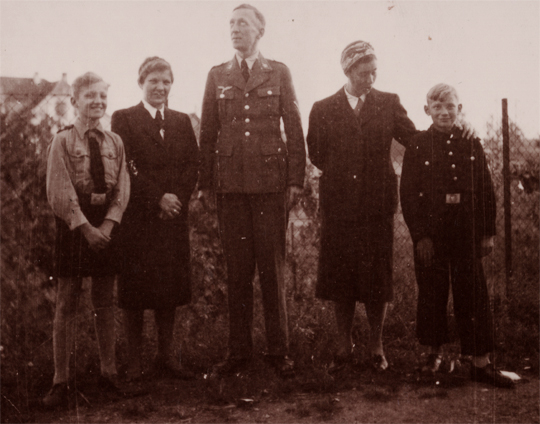From Claude to Lothar
Freiburg, May 31, 2017
There are number of ways to research history. Some bury themselves in archives and write essays at home – essays, that few read. Johannes Heitmann, by contrast, interviewed his grandfather Heiko Heitmann and published his findings in a blog. Heiko told his grandson of his experience of the German occupation of Thann in Alsace. It's a prime example of the method known as "public history," which uses people's life experiences as a source.

From Saarbrücken to Alt-Thann: Heiko Heitmann (left) moved to Alsace in 1942 with his mother, Gerta (second from left), and father, Christian, (center). Heiko's friend Claude can be seen on the right. Two years later, the family fled as Allied US forces approached. Photo: Private Source
DThe history of Alsace during the National Socialist period was the topic of a graduate seminar that Johannes, soon to be a history teacher, took with Prof. Dr. Sylvia Paletschek and her colleague, Dr. Marie Muschalek. "We were on the look out for other forms of processing and conveying historical research," explains Muschalek. As a doctoral candidate in the US, Muschalek had quite a bit to do with new media. A blog is replacing the essay, for example. It fit in this case, as well. Especially since there was already a website on which the blog could be published.
The Ministry of Science of the Federal State of Baden-Württemberg wanted to initiate more research into how the National Socialists ruled. Several universities, including the University of Freiburg, took part in the "public history" website program. The researchers were tidying up their own front steps, so to speak. The histories of the state ministries of Baden and Württemberg during the National Socialist regime were the subject of their investigations. Alsace was part of the area back then. The Nazis occupied it from 1940 to 1944. Hitler gave the leader, or gauleiter, of Baden far-reaching powers to administer the occupied territory.
Torn between Germany and France
"Not everything was controlled from Berlin," Muschalek points out. Wagner moved his people from the ministries and the party into Alsace, which in international legal terms was by no means part of the German Reich. Studying how they operated tells historians a great deal. How they behaved, how much freedom they derived to act, even though they were all Nazis. A "Cultural History of Administrative Operations" is to be published when the project is complete. The account could show how National Socialist ideology softly crept into life through mundane administrative acts.
Heiko Heitmann is now 85 years old. What he told his grandson, Johannes, provides first-hand insight into how the Baden's Nazis behaved in a region whose identity had always been split between France and Germany. There was, for example, a neighbor in Thann who had lost two of her sons. The first, a French soldier, was shot by the Germans. The second was killed as a German soldier fighting on the Eastern front.
Grandson Johannes came to the following realization: "The Germans were continually trying to sense just how far they could go with their repression. After all, they wanted to make the people of Alsace into loyal, German "national comrades." A friend of the grandfather, Claude, had his name changed to Lothar by fiat. German first names were ordered by decree. Bathroom faucets could no longer be labeled froid (cold) and chaud (hot). The attempt to ban everything French from Alsace, while French was still being taught at schools in the Third Reich, led to all sorts of curiosities.
Making sources accessible to everyone
Baden's authorities behaved in a similar way when they introduced the Hitler Youth in Alsace. Says Heiko Heitmann, "Everyone had to join, unlike in the other occupied western territories." A field trip by the seminar to the French city of Strasbourg made clear how the Nazis attempted to co-opt for themselves the Alsace's struggle for its own identity. Without consideration, the Place Kléber (Kléber Square) was renamed Karl-Roos-Platz – after an allegedly "German" martyr. The French, however, actually executed Karl Roos, who was driven to preserve Alsace's own, unique identity.
The students examined run-of-the-mill, administrative sources, which they have analyzed and presented in a way that makes them accessible to everyone. The documents show, for example, that a care home did not have enough wood because it hat to use all its wood ration coupons to build coffins. After the war, no one wanted to be a Nazi anymore, as Johannes Heitmann discovered when he examined the files from Baden's denazifcation tribunals. Says the younger Heitmann, "It is amazing how the way people presented themselves changed."
Anita Rüffer

